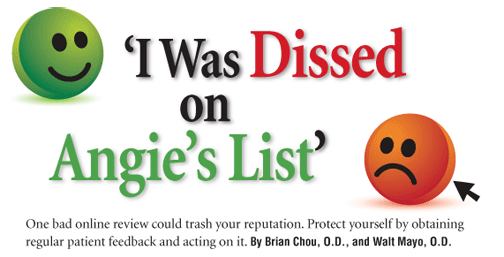
Online ratings were once isolated to reviewing restaurants and hotels. Not anymore. The anything goes environment of online ratings encourages patients to post any and all comments about their doctors.
For example, AngiesList.com, a national online consumer ratings service that once emphasized home improvement, announced last spring that it was also offering ratings on 55 categories of health care practitioners, including primary care and optometry.
Its been one of the biggest requests from consumers, to expand into medical services, said Angie Hicks, the founder of Angies List.1 Theyre taking much more control over their decisions than they were 10 years ago. I could envision that someday the medical ratings could eclipse the othersits one thing to find a good roofer, but finding a great pediatrician or dentist is even more valuable for consumers.
In fact, theres a decent chance that you and your clinic are already rated on a Web site such as Yelp.com, Insiderpages.com or Kudzu.com. Simply search for your name or clinic in Google and you may find one or more of these rating Web sites in the search results. Like it or not, the proliferation of Web sites that rate doctors, including optometrists, can change how patients find you and what they think of you.
Doctors Get a Check-Up
 DO NOT GO HERE!!! I give it ZERO stars. Oh my goodness, I was treated like garbage by all of the staff and the optometrist herself was a B--
DO NOT GO HERE!!! I give it ZERO stars. Oh my goodness, I was treated like garbage by all of the staff and the optometrist herself was a B--
The trend has a strengthening foothold in medicine. Today, there are several dozen Web sites that allow the public to rate doctors (see Popular Doctor Rating Web Sites). The site operators say that they are helping patients find a doctor who is well suited for them.
The leader of the pack, RateMDs.com, was co-founded in 2004 by John Swapceinski. Five years earlier, Mr. Swapceinski started RateMyProfessors.com, a well-known site among college students. On RateMDs.com, users have contributed more 700,000 ratings, including a category for ophthalmology/optometry. Patients can rate their doctors according to their staff, punctuality, helpfulness and their knowledge. RateMDs then assigns each doctor an overall quality rating of good (happy face), average (neutral face) or poor (unhappy face). A survey of the Web sites ratings showed the majority of practitioners have positive ratings. Indeed, according to Mr. Swapceinski, about 75% of online posters share positive comments about their doctor.
Yet, other comments bristle with unrestrained criticism, such as this review of an ophthalmologist: I might have caught him on a bad day, but he was very rude and mean. I wasnt happy that I was made to wait more than 40 minutes for a routine eye exam. When I told him this, he said hes busy and I will wait however long it takes him. I told him I dont intend to return. He said he would rather that patients like me never return. Hes been featured in magazines and I think it all gone up to his head. Too bad he used to be a better doctor.
Rating sites give patients a level of power theyve never had before. What was the old adage, One unhappy patient tells 10 to 20 people, make that 10 to 20 million! writes Paul Zerbinopoulos, O.D., of Wakefield, R.I., in a recent post on Optcomlist, a large optometric listserv established in 1994.
Popular Doctor Ratings Web Sites RateMDs.com RevolutionHealth.com HealthGrades.com MyDocHub.com iWantGreatCare.org DoctorScoreCard.com MDNationWide.org TheHealthcareScoop.com CareSeek.com Vitals.com DrScore.com PhysicianReports.com
Getting flamed by patients is exacting a tangible effect on some doctors. In one case, a thoracic surgeon had his life turned upside-down after one of his patients began posting vicious remarks online about an elective surgery that he performed.2 The surgeons business was severely affected and he suffered significant monetary and emotional costs because of the patients postings. It got so bad that the surgeon became so depressed he considered leaving medicine.
Doctors Say Its Defamatory
Negative rants like these have earned rating Web sites the disdain of doctors. The Internet gives an incredibly broad, far-reaching voice to those that are not always deserving of such a platform, says Trey Sullins, O.D., of Athens, Tenn. The sheer number of such rating sites and the propensity of the unhappy to express their opinion(s) will probably mean that a negative bias will outweigh your happy patients.
Several doctor groups have vocally opposed the online doctor rating sites, claiming that the information may be misleading and unfairly damage a doctors reputation. This sentiment seems to be shared internationally.
In the
 I cant rave about them enough. The optometrist and the optician here are awesome. They did a wonderful job with my glasses and contacts. I have been going to see eye doctors since I was 7 yrs old and this place is by far the best. The staff here is so helpful. I would recommend them highly. Wonderful service.
I cant rave about them enough. The optometrist and the optician here are awesome. They did a wonderful job with my glasses and contacts. I have been going to see eye doctors since I was 7 yrs old and this place is by far the best. The staff here is so helpful. I would recommend them highly. Wonderful service.
Here in the
The current AMA president, Nancy H. Nielsen, M.D., Ph.D., wrote, Not only can incorrect and misleading information tarnish a physicians reputation, its unfair to patients who may consider it when choosing a physician. Erroneous information can erode patient confidence and trust in physicians and disrupt patients longstanding relationships with doctors who know them and have cared for them for years.6
Patient privacy laws prohibit doctors from discussing a patients health care publicly, but consumers are free to say what they want about their doctors online. Courts have generally ruled under Section 230 of the federal Communications Decency Act (CDA) that Web site operators arent liable for third-party comments provided that the operators do not actively screen comments (other than removing objectionable content on a case-by-case basis). The CDA in combination with the Digital Millennium Copyright Act seem to offer immunity to Web sites and Internet services from being sued for comments posted by their users. Instead, the users posting the comments are legally responsible for the content that they post.
The doctor had a very strange, hostile attitude, and didnt seem to have any interest in the patients opinions or preferences. He was extremely impatient with my 13-year-old daughter who was trying on contacts for the first time ever, telling her she couldnt do it after literally about 5 seconds of trying to put contacts in her eyes. Very negative, almost mean to my daughter with some of his comments ... I even heard him loudly complaining about us to the assistant in the other room when he stepped out. Very unprofessional.
Health Plans Join the Fray

While rating Web sites, especially the commercial ones, have not earned credibility or the respect of the doctors being reviewed, that attitude may change as medical insurers are starting their own online doctor ratings.
Certain health insurers, including WellPoint,
Unlike the no-holds-barred approach of commercial sites, the health-plan rating sites are more understanding to the concerns of doctors. For example, WellPoint will only post a doctors rating when at least 10 respondents have submitted data in order to present a more representative picture of the doctor.
Even the federal government might start a doctor rating site. In a recent presentation to members of the South Carolina Optometric Association, AOA trustee David A. Cockrell, O.D., noted that the federal government is considering creating a Web site similar to HealthGrades.com in order to help patients find doctors according to specialtybut, at this time, optometry is not listed as one of the specialties.
Do Patients Believe It?
While the health plans battle commercial rating sites for market share, does all this fuss about doctor ratings even matter to patients?
It sure does, according to a 2008 Harris Interactive poll commissioned by Wall Street Journal Online. Among 2,015
The AMAs American Medical News reported the results of another Harris Interactive poll of 1,007
 [This doc] rocks! She handles my difficult prescription perfectly, which isnt the case with most ODs. She also is easy to work with. One thing Id recommend is getting your glasses elsewhere, though. While her office ... has a great selection, the opticians arent the best, and both my wife and I had problems with them.
[This doc] rocks! She handles my difficult prescription perfectly, which isnt the case with most ODs. She also is easy to work with. One thing Id recommend is getting your glasses elsewhere, though. While her office ... has a great selection, the opticians arent the best, and both my wife and I had problems with them.
Recently, the topic of doctor rating sites made Optcomlist. One doctor felt that there are so many (of these sites) that they wont be very effective. This may have some validity, but if a major Internet service gets into the game, the field could narrow. Google hasnt jumped in, but Yahoo already has.
Yahoo Local has a rating system for businesses which includes all doctors. Ive seen colleagues get brutalized, writes Adam Parker, O.D., of
How? Visit http://local.yahoo.com, enter optometrist and your zip code, and check your status, Dr. Parker advises.
Even if no single ratings site becomes predominant, a simple search on major search engines Google, Yahoo, Live or Ask may gather all the reviews, making them easy for patients to access.
At the end of the day, however, its feedback from their peersother patientsthat matters most to consumers, says Katherine Binns, president of the Healthcare Division at Harris Interactive.8 For this reason, you can bet that online doctor ratings are here to stay.
Competence vs. Customer Service
Although you know what a good eye examination involves, how does a patient judge quality care? In eye care, patients generally do not know whether a slit lamp examination or funduscopy was properly performed.
Instead, the clues that a patient relies on have more to do with receiving good customer service. When it comes down to it, most complaints about doctors are customer service-related and communication errors, says RateMDs John Swapceinski.10 Patients extend these judgments about customer service to the quality of their care. Even if their perceptions are incorrect, it is their reality.
How to Answer Your Critics
At one end of the spectrum, some doctors are taking the approach of controlling their patients rather than listening to them. The Web site MedicalJustice.com, for example, points out that, It only takes one negative Internet posting to impact your livelihood. The site, founded by neurosurgeon Jeffrey Segal, M.D., offers doctors an Internet anti-defamation program. Doctors who participate in this program give patients a contract that obligates patients to get the doctors permission in order to rate them online. This type of concept seems to follow the older and more established model of health care, in which the Almighty Doctors word was taken as gospel and patients obediently complied without challenging authority.
In contrast, the progressive movement in health care is toward patient empowerment. In this model, adherenceor the mutual acceptance toward a common goal of the patients well beingis a better match for todays informed patients. After all, doctors are no longer the exclusive source of information. We compete with direct-to-consumer advertising by pharmaceutical and medical device companies. We compete with what their friends and family say. We compete with the Internet, including anonymous postings on rating Web sites.
Some doctors may choose to respond to the commentary if the Internet rating site allows it. However, responding is fraught with the potential pitfall of directing more attention to the Web site and bolstering that sites perception as a legitimate source of information.
Other doctors may encourage their patients, friends and co-workers to favorably post comments about them onto a rating Web site, attempting to pump up their own standings. Yet this behavior can have a deleterious effect as well. A sudden flurry of glowing reviews, especially by newly registered individuals, becomes suspicious to the casual observer as ballot stuffing. That behavior may invite retributive comments from other anonymous posters.
How to Poll Your Patients In a 2008 Harris Interactive poll commissioned by Wall Street Journal Online, 76% of respondents felt that patient satisfaction surveys were a fair indicator of measuring and comparing quality of care.8 In fact, the poll found that patient surveys were the fairest indicator of quality among eight methods offered (e.g. use of electronic medical records, looking at malpractice history, etc.) Conducting a survey is not always simple, though. As an example, instructing staff to give patients an e-mail survey could cause significant response bias. Staff may withhold offering the survey to unhappy patients without your knowing, especially if they are likely to be mentioned negatively. Furthermore, a larger proportion of elderly patients do not use e-mail. Getting good, actionable data requires careful attention to obtaining a representative sample of your patient base. Right: Symmetrical five-point Likert item. 1. Strongly agree 2. Agree 3. Neither agree nor disagree 4. Disagree 5. Strongly disagree Wrong: Asymmetrical five-point Likert item. 1. Strongly agree 2. Agree 3. Mildly agree 4. Neither agree nor disagree 5. Disagree The question you ask is important as well. For example, you might think a good question to ask would be: On a scale of 0 (worst) to 10 (best), please indicate your level of overall satisfaction in our office. But, what would you do if, over the course of one month, the average satisfaction level dropped from 9.0 to 7.5?
In order to increase the response rate, the survey should have minimal time burden for completing and returning it. For example, a single-question survey answered with a yes or no, which is returnable using a pre-paid addressed envelope, has little response burden and an expected high response rate. To obtain honest and constructive commentary, have a third-party collect and tabulate the data so that respondents are assured that their comments will not be used to retaliate against them.
Each survey question also requires careful design. Survey questions are frequently structured as a five-point Likert item where the respondent indicates their level of agreement or disagreement.
A common mistake is to create an asymmetrical Likert item in which the resulting statistical analysis suffers from whats termed acquiescence bias. That is, instead of the numerical value of 3 corresponding to neither agree nor disagree, it corresponds to mildly disagree, which skews the responses and limits the ability to act on the data.
First, you need to know whether the drop was meaningful or due to chance variation. Second, if there really was a true drop in patient satisfaction, where do you start to increase patient satisfaction?
The fact is that it is quite difficult to pinpoint where to make operational changes in these cases. Thats why its better to ask task-specific questions such as, Were you promptly acknowledged upon entering our office? If there was a significant drop in the number of patients promptly acknowledged, you would know exactly who to speak with to fix the problem.
What You Can Do
Accept that there is at least some merit to online ratings. Ideally, the ratings would exactly reflect how we serve our patients. We all know this is not yet the case, although progress is being made.
Nonetheless, practitioners can choose to act on the publicly posted ratings. Positive comments can reinforce specific operations in the office. You may learn that you or your staff is doing something right, and you can emphasize or build on that.
On the other hand, negative comments might prompt you to analyze whats going wrong, to prevent the same unfortunate patient experience in the future.
To that end:
Get feedback before it gets online. The best strategy for doctors may be to take a proactive stance to online ratings. The goal is to obtain patients feedback before they post anonymously on the Internet. One such method, which the AMA is considering endorsing, is to hire undercover patients to shop practices.11
Another method, which is probably more regimented, practical and cost-effective, is to regularly survey patients to ask how youre doing. (See How to Poll Your Patients.) Based on the results, implement changes to problem areas until subsequent surveys indicate they are resolved.
Give great customer service. Doctors who dont communicate well with patients have lower levels of patient satisfaction, higher rates of complaints, an increased risk of malpractice claims and poorer health outcomes.12 Not surprisingly, doctors who communicate well have the fewest patient complaints. The good news: You can learn to improve your patient communication skills. (See Service with a Smile.)
Keep staff up to snuff. Some patients may spend more time with your staff than they do with you. So, make sure they treat patients right. Regular staff training is essential for both new and experienced staff members. Take time to role play challenging patient scenarios, develop scripts for staff members to follow, audit charts for quality assurance, and set expectation and consequences for staff members in their communication with patients.
Work out the kinks. Ensure consistency with operational procedures. Check that glasses and contact lenses are delivered on time. Follow-up by phone or e-mail with patients to make sure all their concerns are addressed and that their eyewear is working appropriately. If youre often running behind with patient flowcausing patients to waitrevise your scheduling method.
Get professional help. Sometimes you need a fresh set of eyes to observe what youre doing. Or, when the same problems keep cropping up, you may need outside help. If so, hire a practice management consultant to review your policies and procedures to tell you what youre doing right, and to steer you back on track for what youre doing wrong.
Service With a Smile Its not the patients with a problem who will flame you online. Its the ones who are disgruntledthose who feel you didnt listen, didnt ask them about their concerns, didnt take their concerns seriously, had to wait without explanation, or simply didnt like your demeanor or that of your staff. Smile. Be friendly and good natured, not authoritarian or clinical. Look patients in the eye. Shake their hand. Use their names. (For older folks, use Mr./Mrs. plus their last name). If the patient had to wait, apologize. Dont speak in jargon. Ask patients if they understand what youre telling them. Ask them if they have any questions. Give them your full attention when they relate their concerns. Enlist the patient in making clinical decisions. After the exam, summarize the visit and explain whats next for the patient.
Despite attempts by some doctors to squelch online rating Web sites, there is tremendous pent-up consumer demand for this information. Arguably, this sort of consumer-generated Web content is unstoppable. Legal threats by doctors against these Web sites and their participants may achieve little besides directing the public to suspect suppression of veritable information. Although online ratings are an imperfect system, they can hold valuable commentary that helps practitioners achieve patient adherence and optimal health care outcomes.
In general, treat patients the way youd want to be treated in an office visit.
Specifically:
Because optometry straddles rendering professional services and selling material goods, optometry will receive online ratings not only for Web sites that rate physicians, but also those rating businesses in general, alongside plumbers and roofers. Furthermore, because optometry caters to consumer choice, similar to dentistry and plastic surgery, rating Web sites will exert a greater effect on our profession. Plus, its reasonable to think that in the near future, some of the major vision plans may follow suit of WellPoint,
As the dynamics of Web site ratings approach some equilibrium toward greater transparency for both practitioners and patients, successful optometric practice will increasingly require devotion to maximizing patient satisfaction and consistently delivering it. Patient feedback is the cornerstone for driving the identification of areas for improvement and efforts to make improvement. A proactive strategy involves implementing a regularly administered patient survey to assess the critical operations in the practice, and following through with continuous customer-oriented improvement.
Dr. Chou is in private practice in
Dr. Mayo practices in
Tell Us Your Story!
Have you been "flamed" or praised online? Send your experience to us at jmurphy@jobson.com. In your e-mail, please include a link to the posting and tell us what you did about it or learned from it.
1. Ostrov BF. You can rate toasters, cars, and now doctors.
2. Roan S. Doctor ratings: Is your healthcare hot or not?
3. Nowottny S. Lawyers issue formal warning to rate-your-GP website. Pulse 2008 July 15. Available at: www.pulsetoday. co.uk/story.asp?sectioncode=23&storycode=4120053 (Accessed March 19, 2009).
4. Nowottny S. GPs condemn new rate-your-doctor website. Pulse 2008 July 31. Available at: www.pulsetoday.co.uk/ story.asp?sectioncode=35&storycode=4120287&c=2 (Accessed March 19, 2009).
5. Plested WG. Patients ratings of doctors.
6. Nielsen NH. Curbing physician profiling. AMA e-Voice 2008 July 24. Available at: www.ama-assn.org/ama/no-index/news-events/18800.shtml (Accessed March 19, 2009).
7. WellPoint Inc. WellPoint taps Zagat Survey to help consumers rate experiences with their doctors. Press release 2007 Oct 22. Available at: http://ir.wellpoint.com/phoenix. zhtml?c=130104&p=irol-newsArticle_general&t=Regular &id=1065430& (Accessed March 19, 2009).
8. McNerney T, ed. WSJ.com/Harris Interactive study asks: Are there fair and reliable ways to assess healthcare quality? Health-Care Poll 2008 Mar 26;7(3):1-3.
9. Dolan PL. Patients rarely use online ratings to pick physicians. AMNews 2008 June 23/30. Available at: www.ama-assn.org/amednews/2008/06/23/bil10623.htm (Accessed March 19, 2009).
10. McManis S. A checkup on Web-side manners: Patient-generated doctor reviews abound, but are they accurate?
11. Tanner L. AMA to consider endorsing undercover patients.
12. Tamblyn R, Abrahamowicz M, Dauphinee D, et al. Physician scores on a national clinical skills examination as predictors of complaints to medical regulatory authorities. JAMA 2007 Sep 5;298(9):993-1001.

